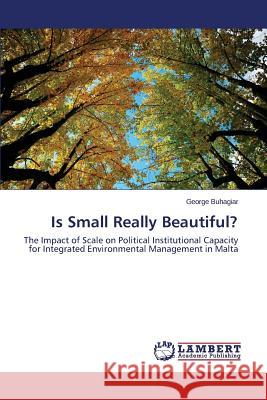Is Small Really Beautiful? » książka
Is Small Really Beautiful?
ISBN-13: 9783659495434 / Angielski / Miękka / 2014 / 628 str.
Malta, a small self-governing parliamentary democracy has contiguous biophysical and political boundaries, characterising the notion of a bioregion, where the small-is-beautiful claim is expected to hold true. However, it is unexplainable how the country's development of integrated environmental management (IEM) capacity left specific environmental problems unchecked for decades, and kept the nation lagging behind in environmental policy. Three case studies - land-use, waste management and bird protection focus on policy responses typical of three important dimensions to sustainability (resource-use, social quality of life and ecology). The impact of small scale is investigated by developing a conceptual framework for political institutional capacity levels for IEM. Small scale makes environmental problems more salient, but the political-economic impact of Malta's scale outruns the advantages for IEM associated with a confined ecological-political Maltese domain, despite that this fits the 'small-is-beautiful' idea perfectly. The concepts and analyses provide fresh insight to policy makers involved in environmental management or capacity building in small-scale governance systems.
Malta, a small self-governing parliamentary democracy has contiguous biophysical and political boundaries, characterising the notion of a bioregion, where the small-is-beautiful claim is expected to hold true. However, it is unexplainable how the countrys development of integrated environmental management (IEM) capacity left specific environmental problems unchecked for decades, and kept the nation lagging behind in environmental policy. Three case studies - land-use, waste management and bird protection focus on policy responses typical of three important dimensions to sustainability (resource-use, social quality of life and ecology). The impact of small scale is investigated by developing a conceptual framework for political institutional capacity levels for IEM. Small scale makes environmental problems more salient, but the political-economic impact of Maltas scale outruns the advantages for IEM associated with a confined ecological-political Maltese domain, despite that this fits the small-is-beautiful idea perfectly. The concepts and analyses provide fresh insight to policy makers involved in environmental management or capacity building in small-scale governance systems.











